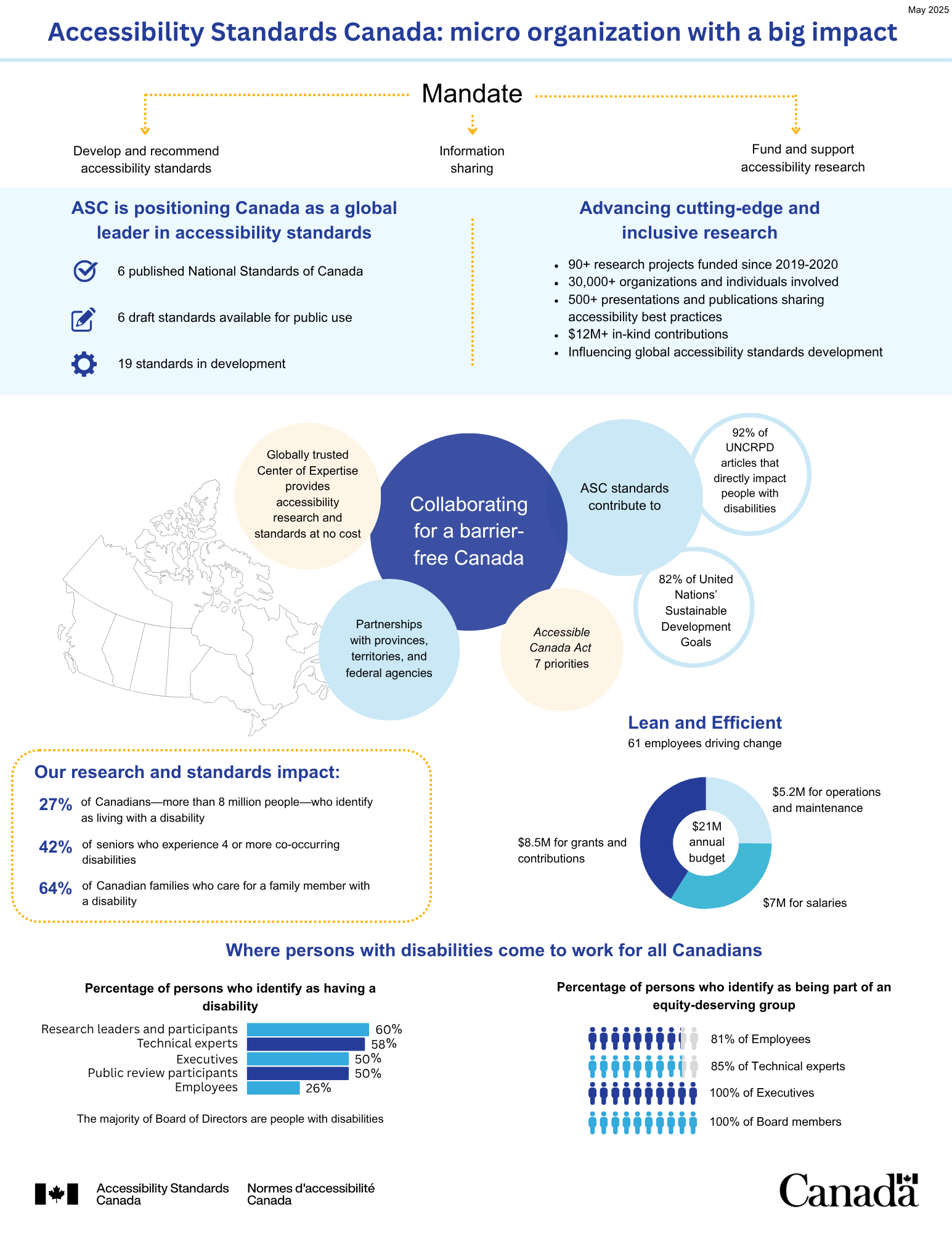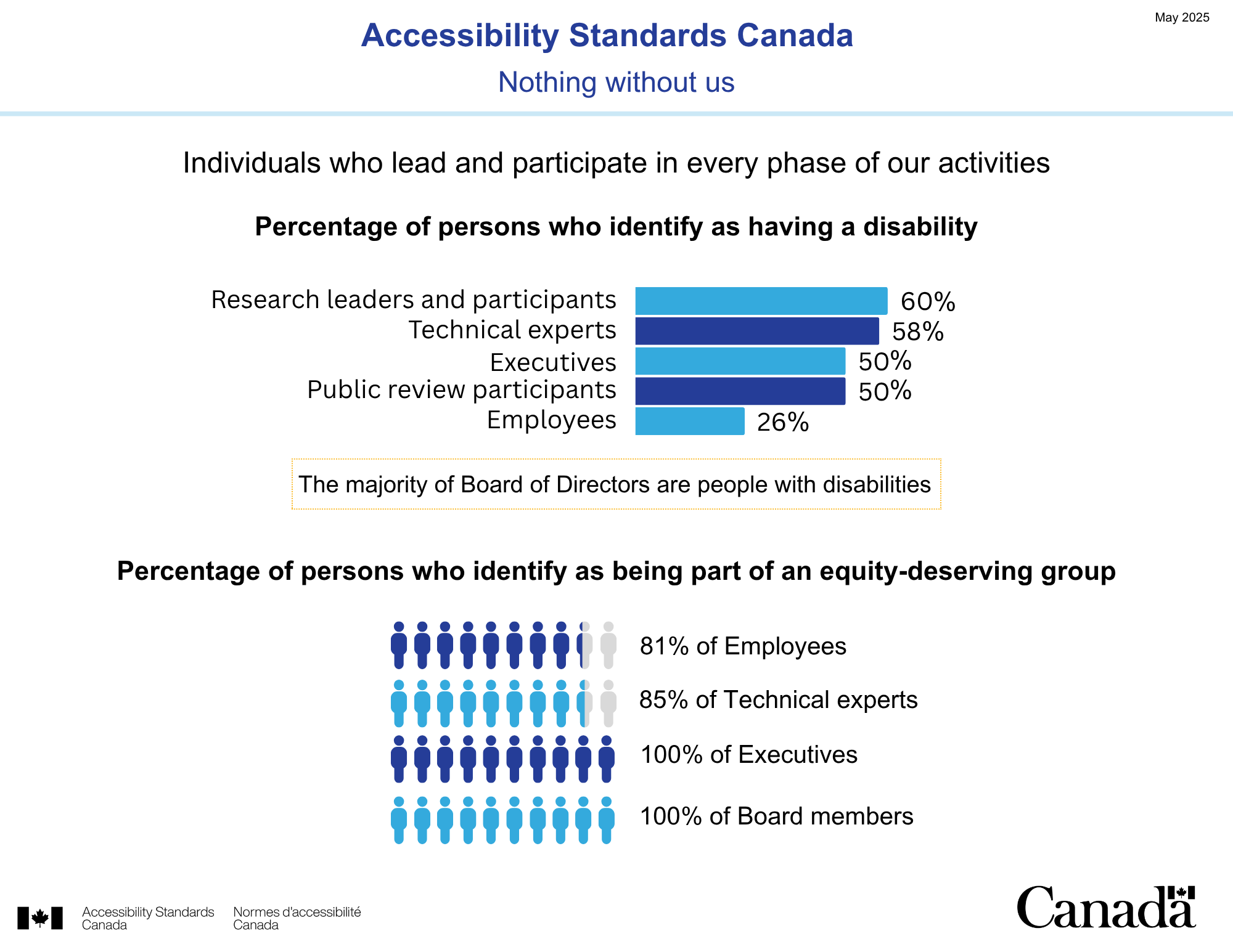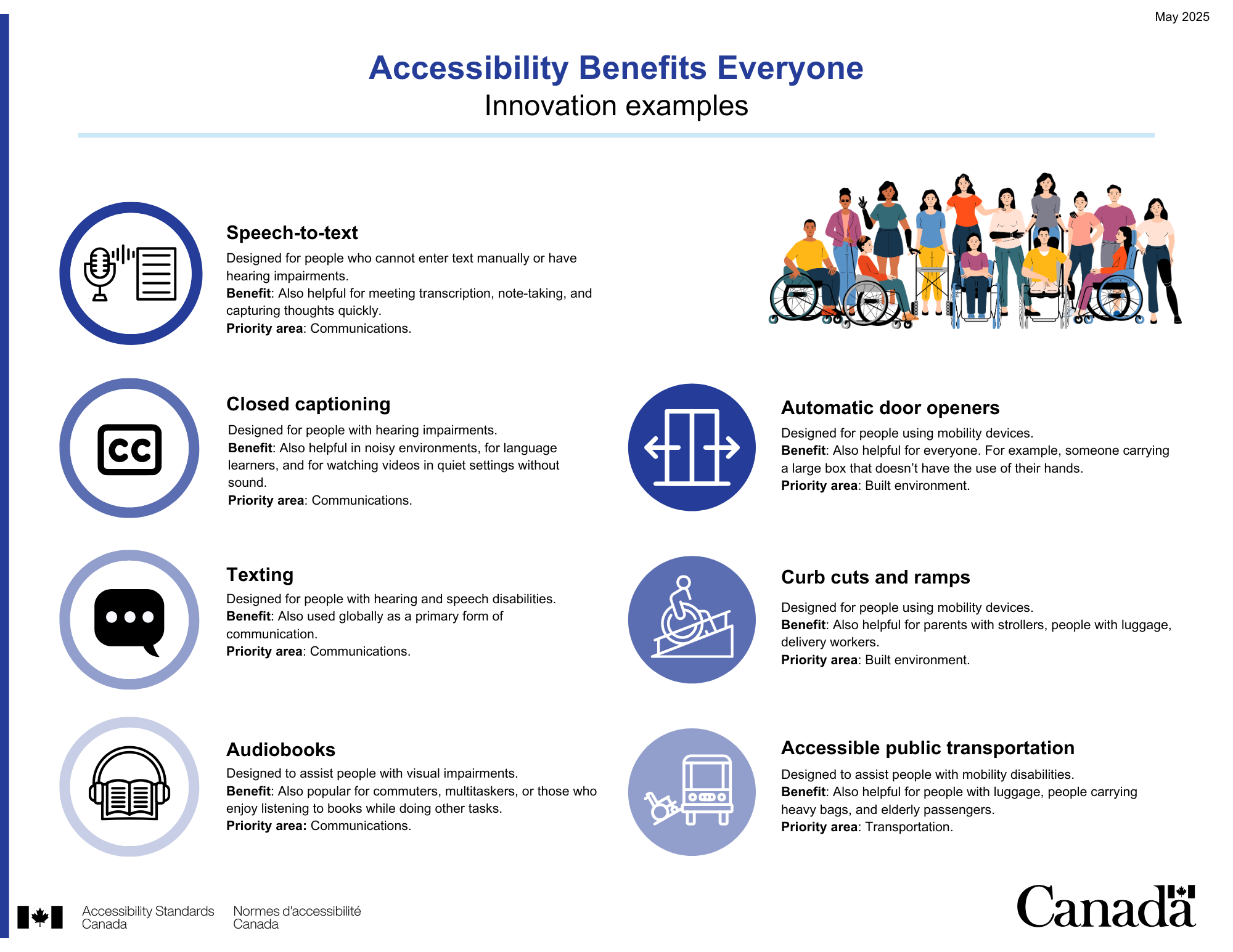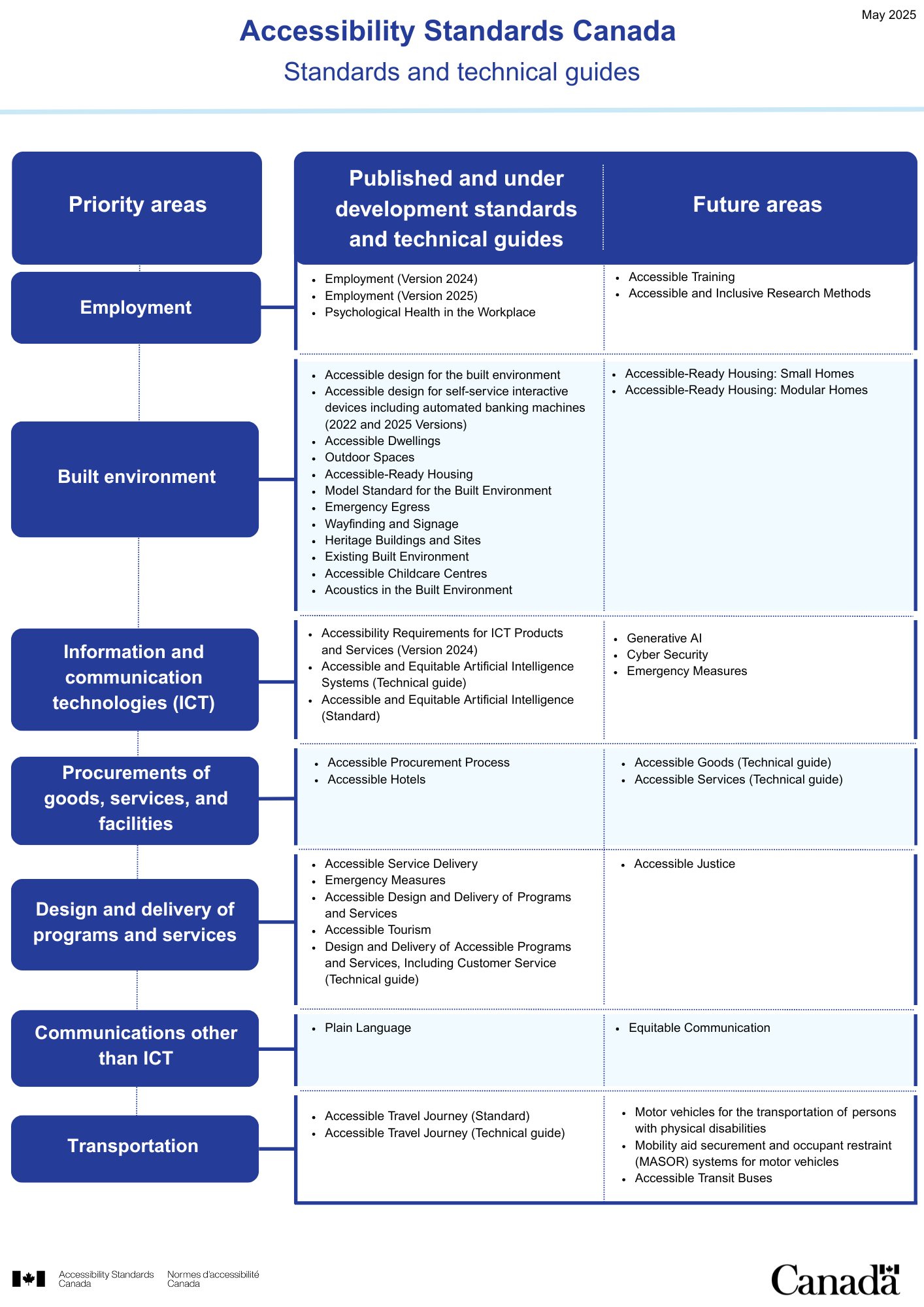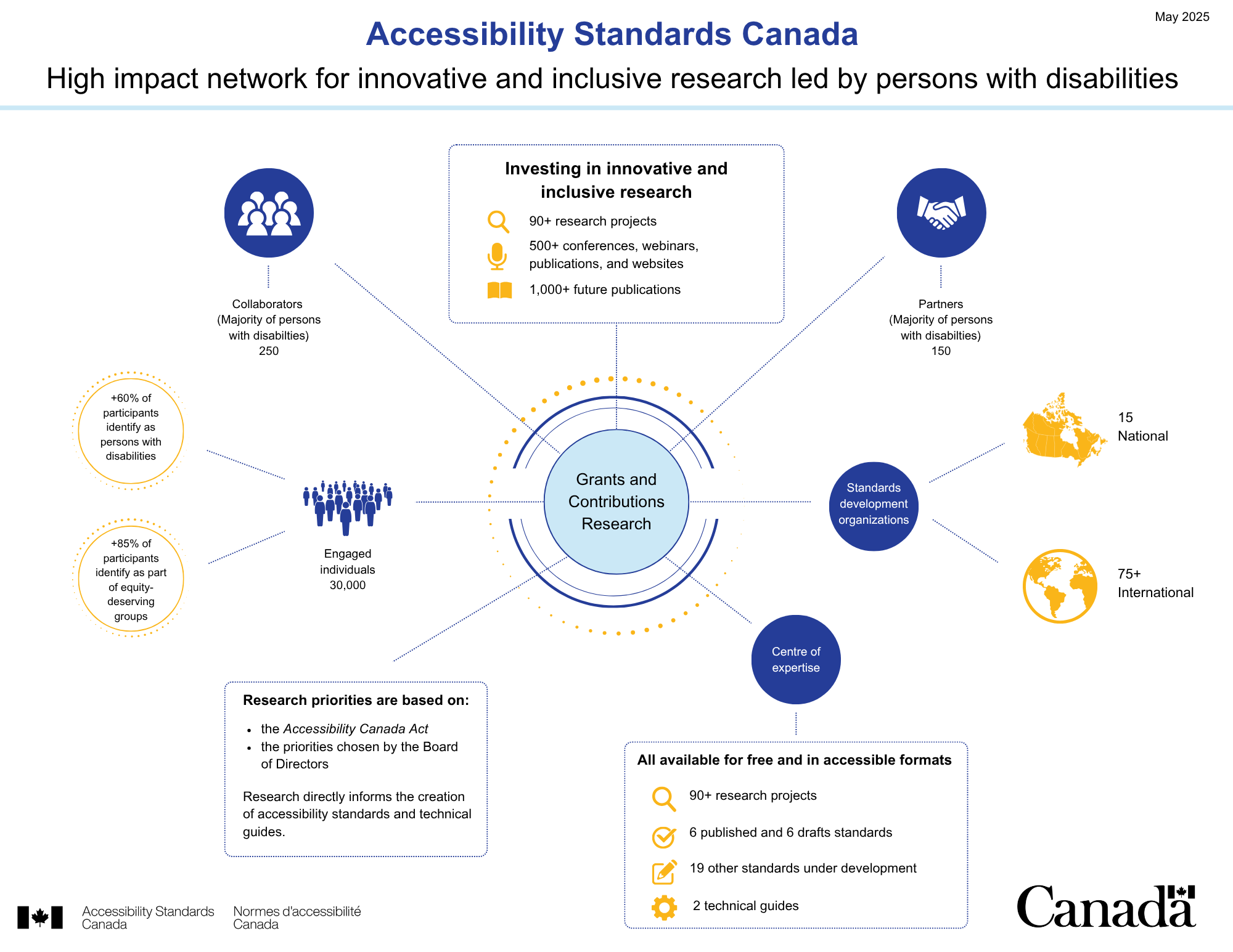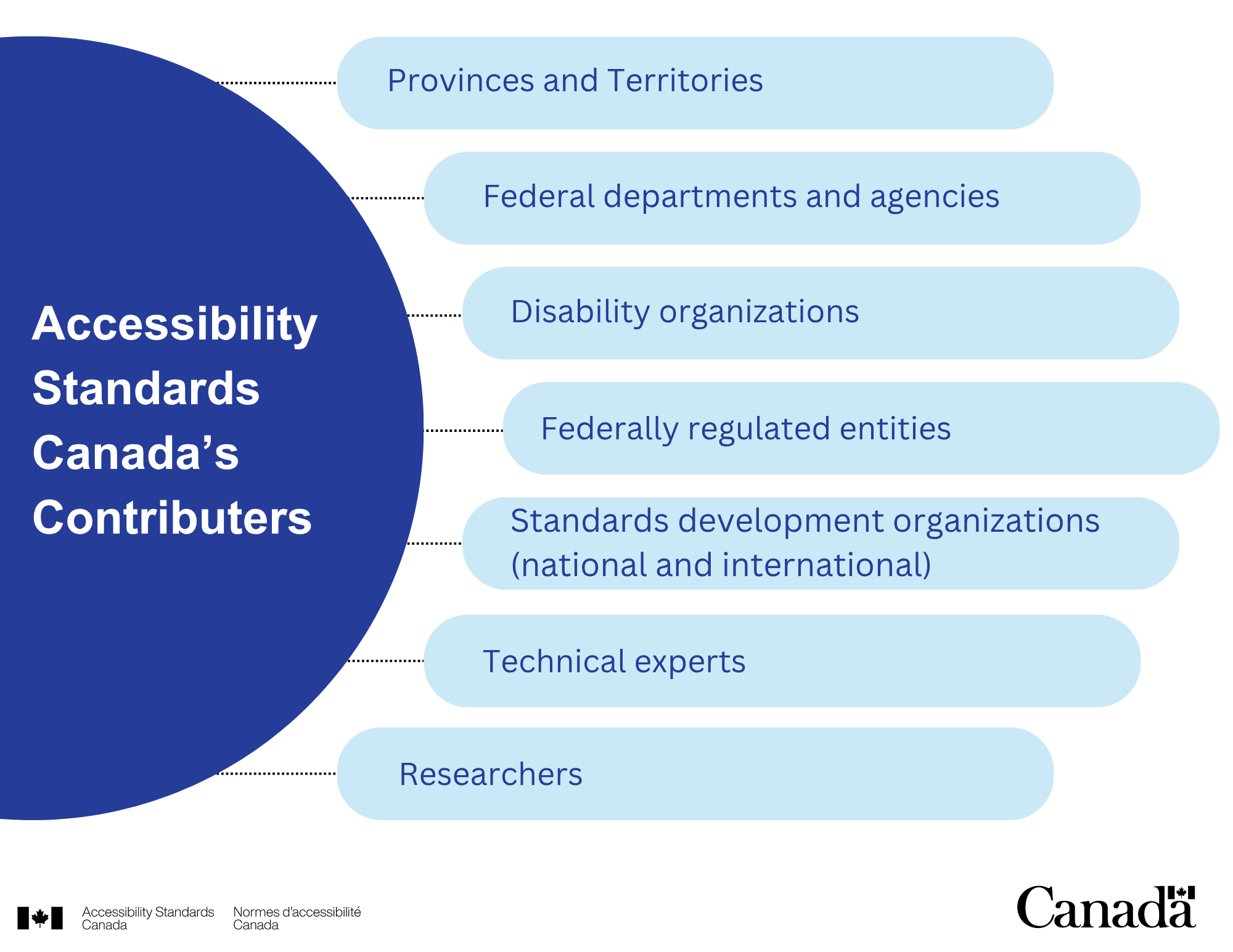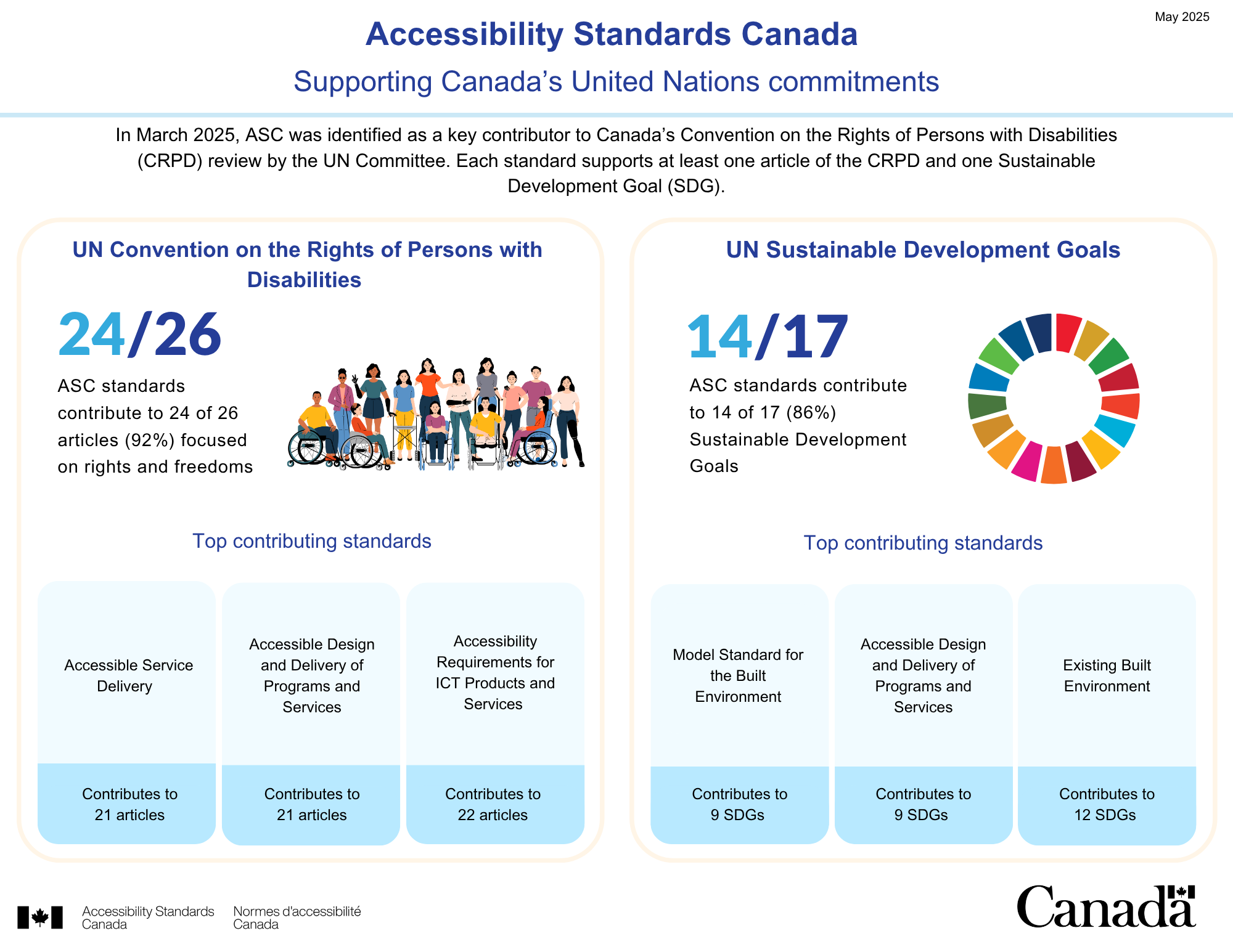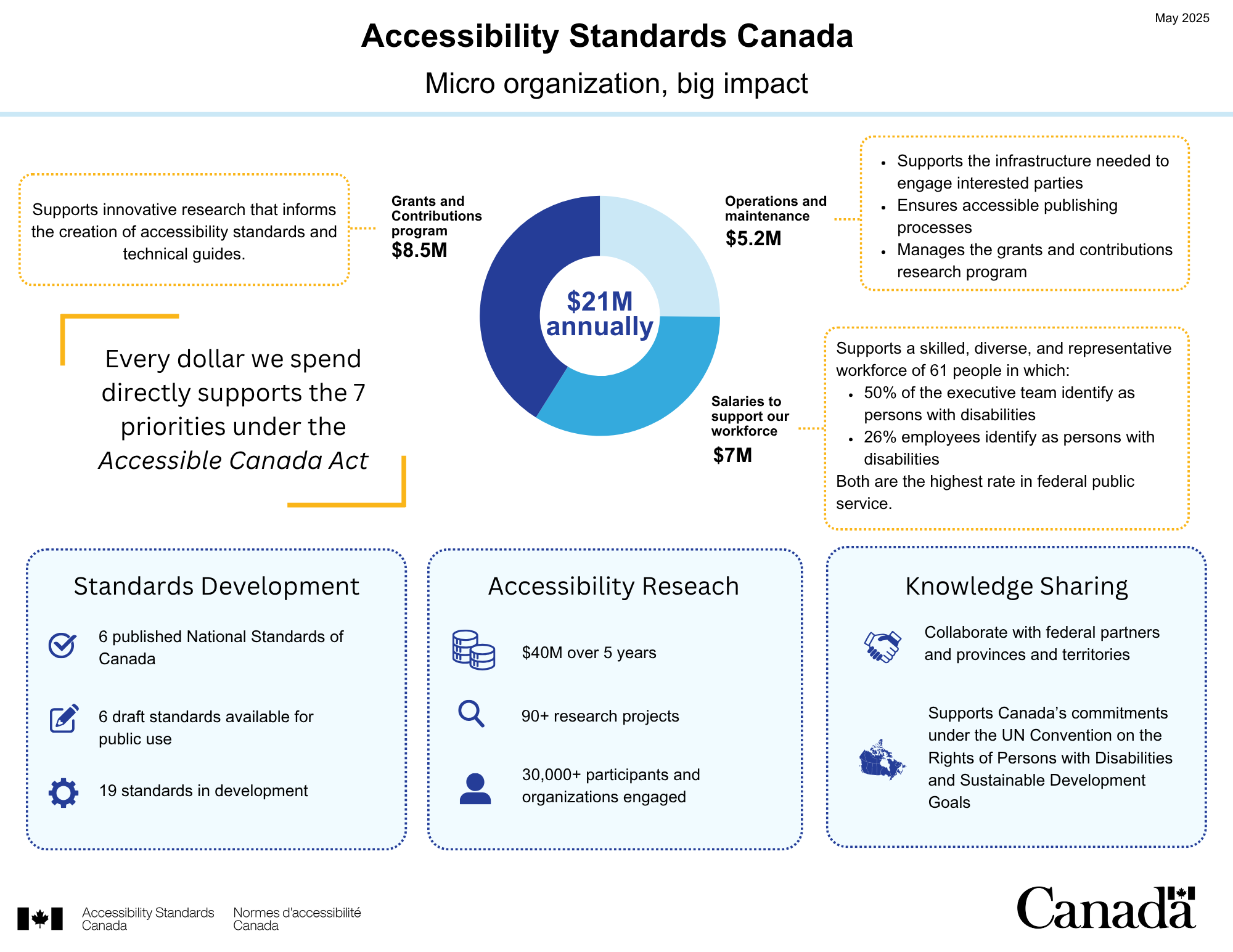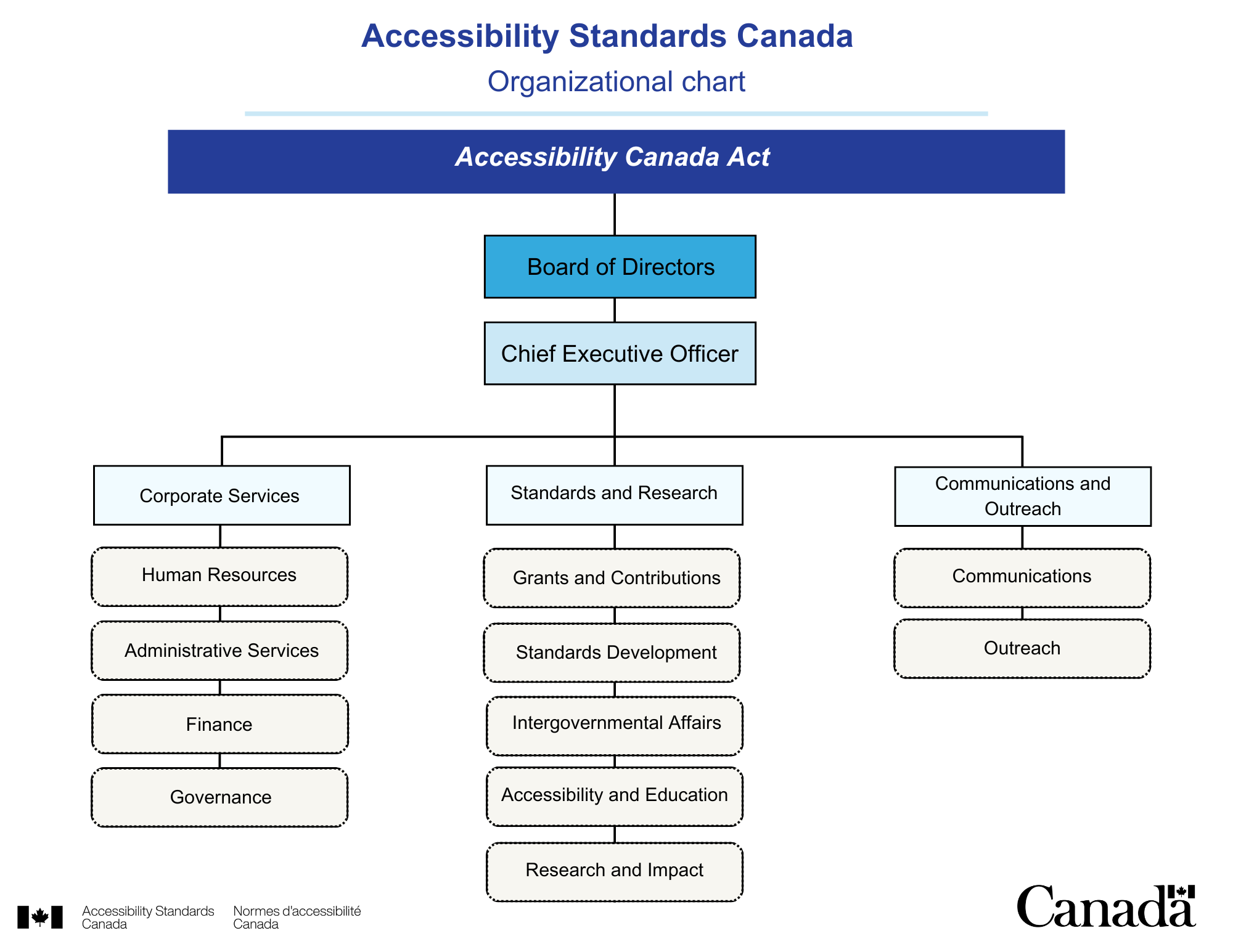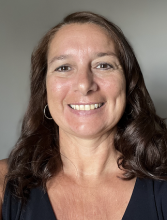Ministerial Transition Binder (May 2025)
Accessibility Standards Canada
Table of contents
- Accessibility Standards Canada (ASC) at glance
- Key considerations for the Minister
- Introduction to Accessibility Standards Canada (ASC)
- ASC’s core activities: micro-organization with a big impact
- Contributing to the inclusion and the rights of persons with disabilities
- ASC’s expenditures: investing in a barrier-free Canada
- ASC’s structure
- Conclusion
- Annex A: Biographies of the Chief Executive Officer and Board of Directors
- Annex B: Accessibility Standards Canada suite of standards and technical guides
Accessibility Standards Canada (ASC) at glance
A micro-organization with a big impact
ASC is the only organization in the world with a legislative mandate solely dedicated to creating accessibility standards—grounded in innovative research and led by persons with disabilities.
The standards ASC develops are helping advance impactful initiatives across the Government of Canada, such as:
- the Housing Design Catalogue;
- the Employment Strategy for Canadians with Disabilities;
- the Accessible Canada Regulations for Digital Accessibility;
- the renovation of the Centre Block Project;
- the Directive on the Management of Real Property; and,
- Statistics Canada’s Accessibility Statistics Hub.
The standards published and under development by ASC will also contribute significantly to other key government priorities, such as childcare, artificial intelligence (AI), and creating as strong Canadian economy. This is being achieved through the efforts of a small yet highly effective team, working with strategically allocated resources.
An inclusive approach that is everyone’s responsibility
Accessibility benefits every Canadian — whether today or at some point in their life. That’s why the development of robust, inclusive accessibility standards is not just important, but essential to building a Canada that supports everyone. When Canadians have access to what they need to be successful, they can meaningfully contribute to their own well-being and to the economic vitality and growth of their communities.
Our standards impact:
- the 27% of Canadians—more than 8 million people—who identify as living with a disability;
- the 42% of seniors who experience four or more co-occurring disabilities; and,
- and the 64% of Canadian families who care for a family member with a disability.
Moreover, as Canada’s population ages, the need for strong accessibility standards becomes increasingly critical. Seniors often face age-related disabilities, such as reduced mobility, vision or hearing impairment, leading to significant barriers in navigating public spaces, accessing essential services, and maintaining their independence. Accessible design in infrastructure, transportation, housing, and digital services empowers seniors to engage fully in their communities with dignity and autonomy. By developing inclusive standards, Canada is better equipped to meet the diverse needs of its growing senior population.
Accordingly, ASC is actively working to build a society where everyone—regardless of age, ability, or circumstance—can participate fully. This includes families, caregivers, employers, and communities that are positively impacted by accessible design and inclusive thinking. Accessibility benefits everyone and is everyone’s responsibility.
A mandate to advance a barrier-free Canada
ASC was established as a departmental corporation in 2019 under the Accessible Canada Act (ACA). A Board of directors, led by a majority of persons with disabilities, sets its strategic direction. ASC’s mandate is to contribute to the identification, removal, and prevention of barriers for people with disabilities through:
- the development of accessibility standards and recommending these standards to the Minister for regulatory adoption;
- the promotion, support, and conducting of research into the identification, removal, and prevention of new barriers; and,
- the dissemination of information, including best practices, to help identify, remove, and prevent barriers.
ASC supports the development and implementation of standards and research across all priority areas of the ACA by integrating accessibility into the core of federal programs, initiatives, and emerging technologies. This approach will help build a resilient, inclusive and accessible Canada for all.
A place where persons with disabilities come to work for all Canadians
ASC embodies the principle of “nothing without us”, where:
- 60% of individuals who lead and participate in our research identify as persons with disabilities;
- 58% of the technical experts who develop our standards identify as persons with disabilities;
- 50% of executives identify as persons with disabilities;
- 26% of employees identify as persons with disabilities; and,
- the majority of the Board of Directors identify as persons with disabilities.
ASC is contributing to a fully inclusive, barrier-free Canada by 2040—where the benefits of innovation and accessibility stimulate national growth and progress. Grounded in equity and led by persons with disabilities, ASC champions a future where every Canadian, regardless of ability, can fully and meaningfully contribute to society and the economy.
A globally recognized and trusted centre of expertise
In a short period of time, ASC has emerged as a global leader in accessibility standards and cutting-edge inclusive research—driven by the leadership and full participation of persons with disabilities in every aspect of its work.
To date, ASC has funded over 90 research projects supporting standards development in all seven ACA priority areas. These projects:
- involve over 30,000 individuals, partners and contributors, and provide employment and research opportunities for persons with disabilities in communities across Canada;
- generate over 500 presentations and more than 1,000 publications focusing on accessibility best practices from Canada and the world; and,
- support changing the culture and processes of national and international standards development organizations to be more inclusive and accessible.
Every standard and research project is available for free and in accessible formats on ASC’s centre of expertise.
A unified approach strengthening collaboration nationally and internationally
ASC is working with Provinces and Territories (PTs) to promote consistency, drive innovation, and ensure that all Canadians experience the same high level of accessibility and inclusion--no matter where they live.
ASC is also establishing collaborative arrangements with international organizations and is helping Canada contribute to its obligations under the United Nations Convention on the Rights of Persons with Disabilities (UNCRPD) and the United Nations Sustainable Development Goals (UNSDGs). For example, ASC standards support:
- 24 of the Convention’s 26 (92%) UNCRPD articles that directly impact people with disabilities; and,
- 14 of the 17 (82%) UNSDGs.
This approach supports Canada’s global commitments, positions the country as a leader on the world stage and reflects a modern, future-focused vision—one that is accessible, interconnected, and inclusive for all.
Infographic 1: ASC at glance
Key considerations for the Minister
ASC looks forward to working with Minister Hajdu to support the advancement of accessibility across Canada and the vision of the ACA. In the coming months, several key priorities are expected to emerge that would greatly benefit from the Minister's leadership. ASC is working on several initiatives, and the focus will be on the following items.
First 120 days (target date subject to the support of the Board)
[Redacted]
Second 120 days
[Redacted]
Introduction to Accessibility Standards Canada (ASC)
A micro-organization with a big impact where persons with disabilities work for all Canadians
ASC envisions a fully inclusive, barrier-free Canada by 2040—where innovation and progress in accessibility are seen and felt across the nation.
Grounded in equity and led by persons with disabilities, ASC champions a future where every Canadian, regardless of ability, can contribute meaningfully to society and the economy. ASC drives the development and supports the adoption of inclusive standards across all priority areas of the Accessible Canada Act (ACA), embedding accessibility into the core of federal programs, policy design, and emerging technologies like artificial intelligence (AI). Through this work, ASC promotes a unified national approach that strengthens interprovincial cooperation, facilitates the free movement of people, and ultimately, supports inclusive economic growth and national cohesion.
Our vision is rooted in innovation, sustainability, and collaboration. ASC advances cutting-edge, inclusive research, and works alongside provinces, territories, Indigenous communities, and private sector leaders to eliminate barriers, share best practices, and promote consistency in accessibility across jurisdictions. This collaborative approach supports Canada’s global commitments and reflects a modern, future-focused vision of a nation that is accessible, interconnected, and beneficial to all.
As a globally recognized and trusted centre of expertise, ASC plays a key role in shaping a more accessible and prosperous Canada. Our work strengthens our national resilience and helps build a more unified, barrier-free future for all.
What sets ASC apart? We may be a small organization, but our impact is significant and driven by the leadership, contributions, and lived experience of persons with disabilities who are at the forefront of meaningful change for every Canadian.
Advancing a barrier-free Canada by 2040
ASC was established as a departmental corporation in 2019 under the ACA. Its mandate is to contribute to the identification, removal, and prevention of barriers for people with disabilities to achieve a barrier-free Canada by 2040.
ASC carries out its responsibilities under the ACA and advances its mandate by:
- developing accessibility standards and recommending these standards to the Minister for regulatory adoption;
- promoting, supporting, and conducting research into the identification, removal, and prevention of new barriers; and,
- disseminating information, including best practices, to help identify, remove, and prevent barriers.
“Nothing Without Us” in action
ASC is the only organization in the world with a legislative mandate dedicated to creating accessibility standards and led by people with disabilities. Its strategic direction is set by a Board of directors composed of a majority of persons with disabilities sets.
“Nothing Without Us” is the principle that drives ASC’s work. It means that the knowledge and expertise of people with disabilities is valued and paramount. ASC is a place where people with disabilities come to work, contribute, and drive meaningful change for all Canadians.
Leadership by persons with disabilities and people identifying as part of equity-deserving groups is embedded across all aspects of our work—ensuring our efforts to build a barrier-free Canada by 2040 are credible, grounded in lived experience, and truly representative.
Led by people with disabilities
ASC is led by a CEO and a Board of Directors, the majority of whom identify as people with disabilities. ASC has a skilled, diverse, and representative workforce that includes:
- an executive team with 50% identifying as a person with a disability and 100% identifying as members of equity-deserving groups;
- 61 employees, with 26% identify as a person with a disability and 81% identifying as members of equity-deserving groups.
Infographic 2: Nothing without us
Accessibility benefits everyone and is everyone’s responsibility
In advancing its mandate, ASC recognizes that accessibility benefits everyone. This idea drives our core activities to remove barriers and promote inclusion in every aspect of Canadian life. Barriers are universal—whether experienced personally or through the people we care about—and they impact all Canadians at some point. That’s why developing inclusive, forward-thinking accessibility standards is vital to shaping a Canada where everyone can participate equally, contribute to economic growth and drive innovation.
These initiatives support:
- over 8 million Canadians—27% of the population–who self-identify as having a disability;
- the 42% of seniors with disabilities, many of whom manage multiple, overlapping disabilities; and,
- the 64% of families across the country who provide care for a loved one with a disability—families that depend on inclusive infrastructure, accessible employment opportunities, and equitable public services.
Moreover, barriers to accessibility exist in nearly every aspect of daily life—from accessing essential services to securing meaningful employment and stable housing. These barriers are especially pronounced for Canadians with disabilities and reflect broader societal challenges that Canada continues to face. For example:
- labour-force participation is significantly lower for people with disabilities. An estimated 741,000 Canadians with disabilities have the potential to work but are not currently employed;
- persons with disabilities are also four times more likely to experience homelessness, have twice the unemployment rate and are disproportionately represented among renters facing housing insecurity; and,
- persons with disabilities represented 27% of the population yet accounted for 42% of renters in core housing need.
Importantly, barriers to accessibility affect more than just people with permanent disabilities. At some point, every Canadian will encounter accessibility barriers—whether:
- temporarily, such as while recovering from an injury or navigating public spaces with a stroller);
- permanently, due to long-term or lifelong disabilities;
- as a result of age-related changes, including reduced vision, hearing, or mobility; or,
- indirectly, by supporting a family member, colleague, or friend with a disability.
Accessibility drives economic growth and innovation
While barriers exist, there is growing recognition of the transformative potential of accessibility. Considering that accessibility benefits everyone--not only is it the right thing to do, but it’s also economically and socially beneficial for Canada. For example:
- a study by the Institute for Work and Health suggests that a fully inclusive society could contribute up to $300 billion in additional GDP to Canada’s economy; and,
- a 2019 TD Economics report found that even modest progress in employment for Canadians with disabilities could increase Canada’s real Gross domestic product (GDP) by approximately $50 billion and create up to 450,000 new jobs.
Through its leadership in standards development and research, ASC is helping Canada meet these challenges head-on by delivering practical, technical solutions that:
- enable the creation of modern, accessible infrastructure across Canada;
- promote meaningful employment opportunities for people with disabilities; and,
- support accessible housing solutions to reduce homelessness and improve housing security.
It is for these reasons that ASC is committed to pushing the boundaries of accessibility. By developing and promoting innovative, inclusive standards that remove barriers, ASC’s work benefits not only people with disabilities, but every Canadian—now and into the future through innovation and economic growth.
Infographic 3: Accessibility benefits everyone
ASC’s core activities: micro-organization with a big impact
Developing accessibility standards
Following international best practices
ASC develops evidence-based standards designed to achieve the highest levels of accessibility. These standards establish equity-based technical requirements that are grounded in national and international best practices. This approach is meant to drive innovation and deliver improved outcomes for all Canadians.
As an accredited standards development organization, ASC develops its standards in accordance with the Standards Council of Canada's (SCC) recognized process for developing National Standards of Canada. While ASC standards are voluntary, they:
- align with international best practices for standards development and aim to minimize barriers to international trade;
- promote trade and inclusion across Canada, through harmonization efforts with provinces and territories; and,
- are developed through a third-party verified process.
Inclusion and accessibility in action
People with disabilities lead and are actively involved at every stage of the standards development process. Accessibility and inclusion are embedded in every step, ensuring that the standards reflect lived experience and drive meaningful change.
ASC provides the necessary supports to ensure that all technical experts can fully contribute to the development of equity-based standards. Published standards are available to the public free of charge, in accessible formats and in both English and French. Summaries of standards are also made available in plain language, as well as American Sign Language (ASL) and Langue des signes québécoise (LSQ).
Importantly:
- 58% of ASC’s more than 200 technical experts involved in standards development identify as a person with a disability and 85% are also members of equity-deserving groups; and,
- over 50% of the thousands of people who have provided comments on our draft standards also identify as a person with a disability.
Standards support all ACA[1] priority areas
- 6 published National Standards of Canada, with 2 new standards anticipated for early fiscal 2025-2026:
- Employment (2025 Revision);
- Accessible Ready Housing; and,
- 6 draft standards available for use on our website.
- 19 standards under development; and,
- 2 published technical guides and 3 technical guides scheduled for publication in 2025 focusing on:
- accessible training;
- accessible hotels; and,
- the design and delivery of accessible programs and services.
Infographic 4: Standards at a Glance
Advancing an accessibility research network
The Advancing Accessibility Standards Research Grants and Contribution program: supporting inclusive research
ASC’s Advancing Accessibility Standards Research Grants and Contributions program (Grants and Contributions Program) funds research that directly supports the development of accessibility standards.
The research incorporates the lived experience of people with disabilities and aims to break down barriers to accessibility, share best practices on accessibility and contribute to a barrier-free Canada.
With $8.5 million in annual funding, the Grants and Contributions Program is a driving force in accessibility research. Since 2019-2020, the program has:
- funded over 90 cutting-edge, inclusive research projects;
- engaged approximately 30,000 individuals across Canada, with:
- 60% who identify as persons with disabilities; and,
- over 85% who identify as members of equity-deserving groups.
- generated over 500 conferences, webinars, publications, and website mentions, with over 1,000 publications focused on sharing accessibility best practices nationally and internationally;
- attracted $13M in additional in-kind contributions;
- supported the development of all ASC standards at various stages of the process by:
- informing the ASC’s Board of Directors in setting priorities for standards development;
- guiding ASC in the development of research documents to support the standards development process; and,
- supporting technical experts who develop standards.
- shared research projects with standards development organizations:
- 15 national; and,
- +75 international.
- contributed to:
- 6 published standards and 6 draft standards;
- 19 standards currently under development;
- 2 published technical guides; and,
- 3 technical guides under development.
Research success stories: removing barriers
The research findings generated through the Grants and Contributions Program are instrumental in helping the federal public service, federally regulated private sectors, and national organizations advance accessibility in line with the priority areas outlined in the ACA and beyond. Here are some key examples of this impact.
- Support for G7 Inclusivity: Research funded by ASC informed Canada’s contributions to the G7 Ministers meeting on Inclusion and Disability, held in Assisi and Solfagnano in October 2024. The meeting concluded with a joint declaration affirming the fundamental right of all individuals to fully participate in civil, social, economic, cultural, and political life.
- Influence at national conferences: Over the past year, ASC-funded research and findings have been cited at numerous conferences and events focused on creating a barrier-free world. . Accessibility-related panels and presentations at various conferences across Canada frequently reference ASC for the quality of the research we fund.
- Enhancing 911 services for people with disabilities: Research on improving 911 emergency services for individuals with disabilities is facilitating the development of an emergency measures standard.
This information has been shared with:
- policymakers from the Canadian Radio-television and Telecommunications Commission (CRTC);
- leading telecommunications providers, including Bell, Rogers, SaskTel, and Telus; and,
- key interested parties, such as the National Emergency Number Association.
- Addressing employment barriers: Various research projects have explored the challenges people with disabilities face in entering, advancing within, and exiting federal government employment. These findings support the development of ASC’s Employment Standard which aligns with broader government initiatives aimed at employing individuals with disabilities.
- AI and smart technology opportunities: Research on the barriers and opportunities presented by artificial intelligence (AI) and other smart technologies for persons with disabilities has led to practical recommendations. These have been incorporated into ASC’s AI standard and technical guide, further supporting the Government of Canada’s Pan-Canadian Artificial Intelligence Strategy.
- Indigenous communities: Research showing the urgent need for accessibility standards for the built environment in Indigenous communities supports the Government of Canada’s National Housing Strategy to improve infrastructure in these communities.
- Performance Indicator Framework for Accessibility Data: ASC has made significant strides in advancing accessibility across the nation by actively supporting the Performance Indicator Framework for Accessibility Data. By providing invaluable resources to Statistics Canada's Accessibility Statistics Hub—a collaborative initiative with Employment and Social Development Canada—ASC not only enhances the availability of crucial data on accessibility but also provides the Canadian public with practical and concrete guidance, fostering a more inclusive society for all.
Supporting other standards development organizations: moving accessibility forward
Research funded through ASC’s Grants and Contributions Program is actively being shared with national and international standards development organizations (SDOs). This collaborative effort is helping these entities embed accessibility into their standards and the processes by which they are developed. Notable examples of this growing influence include:
- over 15 member organizations of the Standards Council of Canada’s Standards Development Organization Advisory Committee (SDOAC); and,
- more than 75 member organizations of the International Organization for Standardization (ISO) Technical Committee on Assistive Products.
As a result, hundreds of SDOs are using ASC’s research to inform and enhance standards development around the world. These collaborations have the potential to positively impact thousands of individual standards, all guided by findings from ASC-funded research. By introducing innovative approaches to creating equity-based standards that promote inclusion and accessibility for all, ASC is helping to drive a culture shift within the standards development world.
Infographic 5: ASC’s Grants and Contributions Program Network
Globally recognized and trusted centre of expertise
ASC’s centre of expertise (COE) is a one stop shop for accessibility standards, research and best practices. Launched in May 2023, the COE is an online space where ASC’s valuable knowledge, expertise and resources are made available for free. When visiting the COE, users can:
- explore ASC’s published and drafts standards, technical guides and all funded research projects;
- access to all content free of charge, including draft standards and technical guides; and,
- download various documents in accessible formats.
Since its launch, the COE has been used both nationally and internationally by a wide rage of partners and interested parties, including:
- federal departments and agencies, such as:
- House of Commons;
- Office of the Privacy Commissioner of Canada;
- Fisheries and Oceans Canada; and,
- Canada Post Corporation.
- federal regulators, such as:
- Canadian Transportation Agency; and,
- Canadian Radio-television and Telecommunications Commission.
- provincial and territorial partners;
- financial institutions;
- airport authorities;
- private sector organizations (such as Walmart, law firms, architectural and engineering firms); and,
- international organizations, such as the European Commission, International Standard Development Organization.
Supporting harmonization across Canada
Promoting consistency: engagement with provinces and territories
To fulfill its mandate, ASC has built strong relationships with provinces and territories (PTs) through both multilateral and bilateral agreements. These partnerships facilitate the sharing of information and foster mutual progress on accessibility, with the goal of achieving a consistently accessible Canada—from coast to coast to coast.
By working closely with PTs, ASC promotes uniformity in accessibility standards, increases efficiency, and ensures that all Canadians, regardless of their location, have equal opportunities for inclusion and participation.
To facilitate collaboration with PTs, ASC has established a range of agreements and multilateral engagements aimed at advancing accessibility initiatives across jurisdictions. These include:
- 9 Memorandums of Understanding (MOUs) with ongoing negotiations for additional MOUs with other jurisdictions. These agreements focus on collaborative efforts to minimize duplication, share accessibility research, and optimize resources to enhance accessibility;
- the Pan-Canadian Forum on Accessibility Standards, which has convened 3 times since 2022. This forum serves as a collaborative platform for ASC and PTs to discuss shared priorities and identify strategies for improving accessibility across jurisdictions; and,
- technical briefings conducted throughout the ASC standards development process, providing PT partners with timely, relevant and specific information on drafts standards under development. To date, ASC has provided numerous technical briefings on topics including:
- Employment;
- Built environment;
- Information and communication technologies (ICT);
- Plain language;
- Artificial intelligence;
- Design and delivery of programs and services; and,
Through these initiatives, ASC is committed to fostering strong partnerships with provinces and territories and advancing accessibility across Canada.
Driving change at the federal level: regulatory and non-regulatory approaches
ASC drives change and supports the federally regulated public and private sectors by proposing both regulatory solutions (recommending a standard to the Minister for regulatory adoption) and non-regulatory solutions, such as proposing to update or make changes to directives, policies and strategies, and other policy instruments.
Some of the regulatory and non-regulatory work that ASC has already contributed to includes:
- recommending the ASC standard on Accessibility requirements for ICT products and services for regulatory adoption;
- recommending the following 3 standards for referencing in the next edition of the National Building Code (NBC), with these changes currently being considered:
- Accessible Ready Housing;
- Accessible Dwellings; and
- Accessible Design for the Built Environment.
- referencing the Accessible Ready Housing standard in the Housing Design Catalogue;
- referencing the Employment standard in the Employment Strategy for Canadians with Disabilities;
- using built environment standards in the renovation of the Centre Block Project; and,
- referencing the accessible design for the Built Environment standard in the Directive on the Management of Real Property.
Collaborating with ACA partners, other departments, agencies, and standards development organizations
Work with partners under the ACA
As part of its mandate under the ACA, ASC works closely with key federal departments, agencies, and partners to advance accessibility nationwide. These collaborations are fundamental to ASC’s mission to develop accessibility standards, conduct research, and promote the widespread adoption of accessibility best practices across Canada.
To ensure a coordinated approach, ASC convenes regular meetings with ACA partners and other government entities. These meetings provide a platform for information sharing, joint planning, and strategic alignment. By fostering ongoing dialogue, ASC strengthens interdepartmental collaboration and ensures that accessibility efforts are unified, comprehensive, and informed by the latest developments in the field.
Key partners include:
- Accessibility Commissioner;
- Office of the Chief Accessibility Officer (CAO);
- Canadian Transportation Agency (CTA);
- Canadian Radio-television and Telecommunications Commission (CRTC); and,
- Accessible Canada Directorate.
Through these partnerships, ASC:
- aligns research funding priorities and program design with regulatory and policy objectives;
- supports the integration of accessibility into diverse sectors, including transportation, communications, tourism, and employment;
- promotes the uptake and dissemination of standards and research outcomes among federally regulated entities;
- facilitates consultations with equity-seeking and disability communities to ensure that accessibility solutions are inclusive and reflective of lived experiences; and,
- encourages consistency in accessibility practices across government and federally regulated sectors.
These collaborative efforts amplify the collective impact of accessibility initiatives and ensure that ASC’s work complements and supports broader federal accessibility goals. These partnerships recognize that accessibility benefits everyone, is everyone’s responsibility and is contributes to the creation of a barrier-free Canada where everyone can participate fully.
Work with other government departments
Through collaboration with other government departments, ASC contributes technical expertise, research insights, and standards that inform government strategies, shape public infrastructure, and guide emerging technologies. The overarching goal is to ensure that accessibility is embedded into the very fabric of governmental policies, programs, and services.
- Employment and Social Development Canada (ESDC):
ASC’s standard on employment has been referenced in ESDC’s Employment Strategy for People with Disabilities, helping to support inclusive hiring practices and reduce the employment gap for people with disabilities. - Chief Information Officer (CIO):
ASC contributed guidance from its Accessible and Equitable Artificial Intelligence Systems Technical Guide to support updates to the Directive on Automated Decision-Making, ensuring that AI technologies are accessible and equitable. - Housing, Infrastructure and Communities Canada (HICC):
ASC is co-developing a national standard on accessible motor vehicles to improve the design and safety of transportation options for persons with physical disabilities, ensuring inclusive transit across Canada. - Public Services and Procurement Canada (PSPC):
ASC is collaborating with PSPC on accessible procurement and built environment standards, including input into the Inclusive Design Guideline and Centre Block renovations, to promote barrier-free federal buildings and services. - Treasury Board Secretariat (TBS):
In partnership with TBS, ASC is piloting accessible signage solutions through the Federal Identity Program and developing a Wayfinding and Signage standard, enhancing navigation in public spaces for all users.
By working across sectors and drawing on expert input, ASC’s work helps to reduce barriers, promote inclusive design, and ensure that people with disabilities are actively considered in Canada’s planning and future development. The result is a more inclusive, accessible, and equitable country for everyone.
Work with other standards development organizations
As a national standards development organization (SDO), ASC also partners with other SDOs to share knowledge, promote accessibility in standards development processes, and drive the adoption of inclusive practices across Canada’s broader standards ecosystem. Working in close partnership with national and international standards development organizations strengthens accessibility practices within the standards development ecosystem. These collaborations promote the integration of accessibility across a range of industries and technologies and ensure that barriers to accessibility are addressed in the creation of standards at home and abroad.
Key SDO partnerships and examples of collaboration
- Standards Development Organization Advisory Committee (SDOAC):
As a member of SDOAC, ASC leads the Working Group on Inclusion, Diversity, Equity, and Accessibility, guiding other SDOs in creating a standards development process which is more inclusive of equity-deserving groups, including people with disabilities. - CSA Group and International Code Council (ICC):
ASC has jointly developed 3 standards with CSA Group and is currently collaborating with the ICC on a new standard. These joint efforts help reduce duplication, improve consistency across jurisdictions, and expand Canada’s capacity to develop accessible standards. - European Telecommunications Standards Institute (ETSI): ASC has partnered with ETSI on the adoption of the accessibility requirements for ICT products and services standard.
- European Committee for Standardization (CEN/CENELEC):
ASC has initiated preliminary discussions with CEN/CENELEC to co-develop a standard on artificial intelligence. - International Organization for Standardization (ISO):
ASC leads Canada’s mirror committee contributing to ISO’s work on assistive devices.
Through its leadership, technical expertise, and collaborative efforts, ASC is advancing a more inclusive standards development environment both nationally and internationally. These partnerships are:
- enhancing the accessibility of the standards development process;
- improving the quality and inclusiveness of the standards themselves;
- supporting global harmonization and innovation in accessible design; and,
- promoting cost-effective, user-centered products and solutions for people with disabilities.
To deepen its inclusive approach, ASC is also funding research to identify the barriers that prevent people with disabilities from participating in the development of standards. This finding will inform concrete recommendations and practical steps for ensuring accessibility is embedded from the outset of standards development--helping to prevent systemic barriers before they are built into new technologies and environments.
Through both collaboration and research, ASC is creating long-term, systemic change that positions accessibility as a foundational principle in the development of standards, both in Canada and around the world.
Infographic 6: Accessibility Standards Canada’s Partners
Contributing to the inclusion and the rights of persons with disabilities
ASC is actively supporting Canada’s commitment to uphold and promote the human rights of persons with disabilities, in alignment with its status as a signatory to the United Nations Convention on the Rights of Persons with Disabilities (CRPD).
Through its standards, ASC provides clear, actionable requirements that also support the United Nations Sustainable Development Goals (SDGs) and the Government of Canada’s efforts to advance the UN 2030 Agenda.
This work not only champions the rights of persons with disabilities within Canada but also plays a crucial role in helping the country fulfill its obligations under the CRPD and the UN 2030 Agenda.
The CRPD: advancing the rights of Canadians with disabilities
ASC has contributed to the implementation of the CRPD by:
- supporting the Canadian delegation at the Conference of State Parties to the Convention on the Rights of Persons with Disabilities (COSP) since 2024;
- serving as a key contributor to the reporting process on questions related to Canada’s implementation of the CRPD at the United Nations committee on the Rights of Persons with Disabilities in March 2025; and,
- developing and publishing standards that currently align with and support 25 of the 26 CRPD articles focused on the rights and freedoms of people with disabilities (articles 5 through 30 of the CRPD). This includes:
- Accessibility requirements for ICT products and services standard, which contributes to 22 articles;
- Employment standard, which contributes to 11 articles; and,
- Accessible Service Delivery draft standard, which contributes to 21 articles.
UN SDG’s: contributing to the 2030 Agenda
ASC standards play a key role in advancing the Government of Canada’s commitment to the 2030 Agenda. By aligning with the United Nations Sustainable Development Goals (SDGs), ASC’s standards support national and global efforts to a more inclusive, sustainable and equitable society—benefiting Canadians and communities around the world.
All ASC standards published and under development:
- contribute to at least 1 SDG; and,
- combined, contribute to 14 of the 17 SDGs with several standards contributing to multiple goals. Key examples include:
- Accessible Design and Delivery of Programs and Services, supporting 12 goals;
- Model Standard for the Built Environment, supporting 9 goals; and,
- Existing Built Environment, supporting 9 goals.
Infographic 7: ASC’s contribution to CRPD and SDGs
ASC’s expenditures: investing in a barrier-free Canada
With an annual budget of $21 million, ASC strategically invests in inclusive standards, innovative research, and impactful national and international collaborations. These investments ensure that accessibility is woven into programs, services, public services, and infrastructure—positioning Canada as a global leader in accessibility standards and research. ASC is doing its part to help build a resilient, unified and economically strong Canada for all.
ASC’s budget snapshot
- $7 million (34%) for salaries to support its workforce;
- $5.2 million (25%) for operations, maintenance and accessibility accommodations (including standards development, support to technical committees, all publications, and sharing of information, to name only a few); and,
- $8.5 million (41%) for the Grants and Contributions program supporting research focused on accessibility.
Infographic 8: ASC’s Budget Snapshot
ASC’s structure
ASC is led by a Board of Directors. The Board sets the strategic direction for ASC’s activities. The majority of Directors are people with disabilities and reflect the diversity of Canadian society.
Operationally, ASC is structured across 3 core branches:
- Standards and Research
- Communications and Outreach
- Corporate Services
Each branch plays a key role in delivering ASC’s mandate.
Infographic 9: Organizational Structure
Conclusion
The barriers faced by individuals with disabilities—especially in employment and housing—highlight an urgent issue that affects millions of Canadians:
- Persons with disabilities experience significantly higher unemployment rates than those without disabilities;
- many Canadians with disabilities face significant barriers related to the affordability and supply of accessible ready housing[2];
- 27% of Canadians—more than 8 million people—identify as living with a disability;
- 42% of seniors with a disability experience 4 or more co-occurring disabilities; and,
- 64% of Canadian families provide care for a family member with a disability.
Accessibility is not only a disability issue—it is a universal issue. Whether temporary, permanent, or age-related, barriers to participation will affect everyone at some point in their life. As such, accessibility benefits everyone—and is everyone’s responsibility.
The economic case is also compelling: a study by the Institute for Work and Health estimates that a fully inclusive society could add more than $300 billion to Canada’s gross domestic product (GDP) and economy[3] - underscoring the immense potential that lies within a society that embraces all its members.
Accessibility is not confined to just those living with disabilities; ultimately, it’s a driver of innovation, productivity, and economic growth. Everyday innovations – like curb cuts, texting, closed captioning, text-to-speech, and automatic doors – began as accessibility solutions and now improve life for all.
Since its creation in 2019, ASC has been making progress in fulfilling its mandate to identify, remove, and prevent barriers to accessibility. As Canada’s only organization dedicated exclusively to developing accessibility standards, ASC ensures that persons with disabilities lead and are active contributors throughout the development of standards.
To date, ASC has:
- published National Standards of Canada, with other standards under development in every priority area of the ACA;
- funded innovative accessibility research that is now being used by organizations in Canada and around the world;
- built partnerships with federal government departments, provinces, and territories, and national organizations to promote accessibility across Canada while helping to harmonize requirements and remove barriers from coast to coast to coast; and,
- collaborated closely with international standards organizations to leverage and adopt best practices, advance accessibility innovations while promoting a consistent global standards approach to accessibility.
As Canada moves towards becoming a barrier-free country by 2040, ASC is poised to play an even greater role. The foundation laid so far not only help eliminate barriers—they unlock opportunities for all Canadians. ASC’s ongoing work will continue to contribute to economic growth and help find solutions to support an aging population and build a Canada where everyone can contribute and thrive.
Annex A: Biographies of the Chief Executive Officer and Board of Directors
Chief Executive Officer
Dino Zuppa
Zuppa, Accessibility Standards Canada’s CEO, also oversees the development of equity-based accessibility standards supported by pioneering research funded by Accessibility Standards Canada’s grants and contributions program.
Dino’s career spans more than 25 years. He led a number of strategic initiatives at all orders of government in Canada, and at an American University.
Dino holds a Ph.D. and lives in Ottawa with his wife and two kids.
Board of Directors
Chairperson: J. Paul Walsh
Since January 2021, J. Paul Walsh has been the Chief Executive Officer at the Autism Society of Newfoundland & Labrador. He is responsible for the overall direction of the organization and oversight of its daily operations. Previously, Mr. Walsh worked in the private industry in the banking and utility sector for 35 years. During that time, he was also a course instructor at the Faculty of Business Administration, Memorial University. He holds a Bachelor of Commerce, Master of Business Administration, and a Master’s Certificate in Project Management.
Over the years, Mr. Walsh has done various community and volunteer work on boards, committees, and councils. These include the St. John’s Transportation Commission, the Coalition of Persons with Disabilities-Newfoundland and Labrador, and the Newfoundland and Labrador Provincial Advisory Council for the Inclusion of Persons with Disabilities.
He is a mentor, coach, and leader with a strong track record of developing emerging professionals. Mr. Walsh was the recipient of EmpowerNL’s 2020 Cecilia Carroll Award for Independent Living in recognition of his personal commitment exceeding 20 years to the full inclusion of people with disabilities. He was also a finalist for the Newfoundland and Labrador Human Rights Award.
Vice-Chairperson: Matthew Shaw
Matthew Shaw was born with a deafblind condition. He is dedicated to helping governments, industries, private companies, and non-profit organizations. He focuses on removing barriers that prevent people with disabilities from participating in economic and social life.
Mr. Shaw is the Head, Accessibility Practice for the Rick Hansen Foundation. Since 2022, he has provided technical expertise to help accessibility professionals and the design and construction industries adopt the Rick Hansen Foundation Accessibility Certification™.
Mr. Shaw is also an entrepreneur and consultant. In 2020, he founded Disability Solutions, an accessibility practice. This organization helps others understand their accessibility responsibilities. It also helps them grow their market share and improve products and services by considering the needs of people with disabilities.
He has also worked with many charities and non-profit organizations through Shaw Philanthropy Partners. This philanthropic consulting practice provided strategic counsel to help organizations grow revenue to support their missions.
Before joining the Board of Directors, Mr. Shaw served as a member of the technical committee responsible for accessibility in the built environment at Accessibility Standards Canada.
He also serves on various committees and boards, and is the Vice Chair of Canadian Blind Hockey, the fastest growing parasport in Canada.
Director: William Adair
William Adair is the Executive Director of Spinal Cord Injury Canada, a charity that helps people with spinal cord injuries and other physical disabilities to be able to do more on their own and be fully part of their community.
Mr. Adair has a lot of experience in the areas of healthcare and disability. He was one of the members who started the Canadian Disability Policy Alliance, the Ontario Neurotrauma Foundation, and Candlelighters Canada. He has also helped the Government of Canada through the Federal Accessibility Legislation Alliance, the Working Group on Alternate Format Materials and the Parliamentary Precinct Advisory Panel.
Mr. Adair has a Bachelor of Science (University of Minnesota). He did the Executive Leadership Course on the Management of Non-Profit Organizations (Harvard University). He received Canada’s Meritorious Service Medal in 2016, which is an award for great Canadians who have done wonderful things that bring honour to our country.
Director: Lucille Linda Berlinguette-Saumure
Lucille Berlinguette-Saumure is an accessibility professional with 20 years of experience in accessibility planning, policy development, training and problem solving in the built environment, communications, transportation, customer service and programs. With a background in social work, she devoted more than 33 years of service to the City of Ottawa, serving equity deserving groups and vulnerable residents. From 2008 to 2024, she worked as a program manager and specialist of accessibility.
In her role, she provided leadership, expertise and guidance to the city in matters of accessibility. She also led the city in the implementation of the Accessibility for Ontarians with Disabilities Act. Mrs. Berlinguette-Saumure is an advisory council member and chair of the Policy Community of Practice of the Canadian Accessibility Network. She is also a member of Ontario’s Customer Service Standards Review Committee.
From 2023 to 2024, Ms. Berlinguette-Saumure chaired the technical committee responsible for Design and Delivery of Accessible Programs and Services including customer service. This committee’s role is to assist Accessibility Standards Canada in creating the first Canadian Accessible Service Delivery standard.
Mrs. Berlinguette-Saumure is a bilingual Métis woman who has lived experience with episodic non-visible disabilities, including hearing impairments, mental health conditions, and environmental sensitivities. She believes that accessibility benefits everyone and that including persons with disabilities is essential for creating a more accessible and inclusive world.
Director: Wissam Constantin
Wissam Constantin is a well-known leader in the Deaf community since moving to Canada in 2017. Mr. Constantin is a Community and Events Manager at Canadian Administrator of Video Relay Services (CAV) since 2022. Mr. Constantin shares his true passion as a Deaf advocate for a better quality of life in the Deaf community, especially those who use sign language as the primary language of communication. He was involved with the Canadian Association of the Deaf (CAD) for several years as a former President, Vice-President and Project Director.
Mr. Constantin participated in federal government consultations on policy developments and accessibility implementations, especially public proceedings with the Canadian Radio-television and Telecommunications Commission (CRTC). He was also on the Canadian Association of the Deaf’s committee for organizing and advocating for ASL-LSQ legal recognition in Canada in 2018-2019.
Mr. Constantin was the first Deaf university graduate in Lebanon, where he earned a Bachelor of Science in Medical Laboratory Technology and a Master’s degree in Microbiology and Immunology. He is currently completing a Bachelor of Arts in Political Science for Canadian Politics and Public Policy, with a minor in Law at Carleton University, Ottawa.
Director: Sarah Ève De Lisle
Sarah Ève De Lisle is an accessibility professional with more than 20 years’ experience. She perfected her skills by managing public transportation and infrastructure projects for private and public organizations. She also managed her own accessibility consulting business for 5 years.
Ms. De Lisle is currently the Manager of Accessibility and Regulations at Aéroports de Montréal (ADM). There, she set up a management system to maximize compliance with accessibility laws and regulations.
She has provided her expertise on inclusive design to several companies. She was the accessibility coordinator for the planning and development of public transportation in the Greater Montreal area for close to 10 years, from 2008 to 2013 and 2018 to 2022.Since 2021, Ms. De Lisle has been a member of two Accessibility Standards Canada technical committees.
These committees focused on emergency egress (February 2021) and built environment accessibility (July 2021). As a specialist in universal accessibility, she participates in symposiums, co design workshops and round tables with various associations in Ontario and Quebec. She was a participant in and writer for the TRANSED international conference on the mobility and transport of older adults and people with disabilities in Hong Kong (2010) and New Delhi (2012). For many years, she took care of her brother who has muscular dystrophy. She became aware of daily systemic barriers, which led her to a bachelor’s degree in environmental design (products, architecture and areas) from the Université du Québec à Montréal. Since university, her projects have focused on improving accessibility for all.
Director: Maureen Haan
Maureen Haan is the President and Chief Executive Officer of the Canadian Council on Rehabilitation and Work. This organization helps persons with disabilities to overcome obstacles with getting a job and also helps bosses to become leaders in hiring and keeping employees with disabilities.
Ms. Haan speaks American Sign Language and she has a lot of professional and volunteer experience. From 2001 to 2012, she was the Executive Director of Silent Voice, an organization that has programs and services for deaf adults, children and their families in American Sign Language.
Ms. Haan defends the rights of persons with disabilities and has been a member of many groups and committees. She is a board member for the Canadian Association of Supported Employment and a board member for the College of Vocational Rehabilitation Professionals. She is a member at the Canadian Standards Association, and a member of the Disability and Work Canada Conference committee.
Ms. Haan has a Bachelor of Arts in Psychology (York University).
Director: Joe McLaughlin
Joe McLaughlin started McLaughlin Educational Consulting Services and has been President of the Canadian Branch of the International Catholic Deaf Association since 2012. He uses American Sign Language. The research done by Mr. McLaughlin includes social justice (creating a more fair society), development of non-profit organizations and studies on deafness.
He was the Dean of Deaf Studies and Special Services at Ohlone College in Freemont, California, from 2004 to 2008. He is an assistant professor at the University of British Columbia. M. McLaughlin has a Bachelor of Arts in Psychology (Gallaudet University, Washington, D.C.) and a Masters of Arts in Education and Counselling Psychology (University of British Columbia). He also has a Doctor of Education in Higher Education Administration (Alliant International University, San Francisco, California).
Director: Sarah Anne Moore
Dr. Sarah Moore is an associate professor in the School of Health and Human Performance at Dalhousie University. She also works with the Departments of Pediatrics and Physical Medicine and Rehabilitation. She is an Affiliate Scientist in Pediatric Rehabilitation at IWK Health and a member of Dalhousie University’s Wheelchair Research Team.
Dr. Moore’s current research focuses on understanding and solving health challenges faced by children and youth with disabilities. She holds a PhD in Experimental Medicine, specializing in pediatrics, from the University of British Columbia. She also holds a Master of Applied Health Sciences, specializing in pediatric exercise medicine, from Brock University in Ontario.
Dr. Moore directs the ParaPLAY Hub at Dalhousie University. She has authored or co-authored over 60 peer reviewed papers and have shared her work at over 100 conferences and public events. Her work is often featured in print and digital media. Collaborating with youth with lived experience of disability, Dr. Moore has also established a Youth Advisory Panel, which is co-led by 2 teens experiencing disability. Much of the research and knowledge sharing activities that Dr. Moore and her trainees engage in is guided by this Panel.
For the past 20 years, Dr. Moore has taught courses in exercise science, rehabilitation, health promotion, therapeutic recreation, nursing, and medicine at various institutions across Canada. She has also coached several adapted and parasports including wheelchair basketball, sledge hockey, powerchair soccer, therapeutic horseback riding, and others.
Dr. Moore has received many honours and awards for her research, teaching, and community service. She is a member of several boards, including Easter Seals Nova Scotia and the North American Society for Pediatric Exercise Medicine. Dr. Moore also sits on Nova Scotia’s Accessibility Advisory Committee.
Director: Mojgan Yazdani-Seysan
Mojgan Yazdani-Seysan has over 15 years of work experience in the coordination and management of not-for-profit organizations. Through this experience she gained valuable experience in strategic planning, organizational management, and driving impactful change. Over her career, she has worked closely with the disability community. She has fostered collaborative relationships with diverse stakeholders including government agencies, community organizations, and businesses. Together, they promote accessibility initiatives and ensure comprehensive engagement in the decision-making process.
Mrs. Yazdani-Seysan is the executive director of Centre Action since 2021. In this role she supports and advises the board of directors, develops operational plans, identifies partnerships, oversees programs and services while maintaining financial health, and managing HR policies and practices.
She previously worked at AVATIL, from 2011 to 2021, where she managed 3 residences for individuals with intellectual disabilities. She ensured their safety, accessibility, and conformity, while collaborating with government funding partners.
She holds a D.E.S.S. in Human Resources from McGill University, in Montréal, and a Master of Health Science (Quebec Comparative Evaluation: General Master of Health Sciences) from Isfahan University in Iran. She had a private practice as a family health professional practitioner in Tehran, Iran, from 1996 to 2002.
Annex B: Accessibility Standards Canada suite of standards and technical guides
Published National Standards of Canada (6 Published NSC’s)
- ASC-1.1: 2024 – Employment
- ASC EN 301 549: 2024 – Accessibility requirements for ICT products and services (EN 301 549:2021, IDT)
- CSA/ASC B651:23 – Accessible design for the built environment
- CSA/ASC B651.2:22 – Accessible design for self-service interactive devices including automated banking machines (2022 Version) [4]
- CSA/ASC B651.2:25 – Accessible design for self-service interactive devices including automated banking machines (2025 Version)
- CSA/ASC B652:23 – Accessible Dwellings
Published draft standards (6 drafts currently available)
- ASC-2.1: Outdoor spaces
- ASC-2.3: Model Standard for the built environment - accessibility for federally regulated entities as defined in the Accessible Canada Act
- ASC-2.8: Accessible Ready Housing
- ASC-3.1: Plain Language
- ASC-5.2.1: Part 1: Design and delivery of accessible programs and services: accessible service delivery – accessibility for federally regulated entities as defined by the Accessible Canada Act
- ASC-6.2: Accessible and equitable artificial Intelligence Systems
Standards under development (19 under development)
- ASC-1.1:2024 – Employment (Revision 2025) (Part 2, which adds additional content
- ASC 2.1: Outdoor Spaces
- ASC-2.2: Emergency Egress
- ASC 2.3: Model Standard for the Built Environment - Accessibility for federally regulated entities as defined in the Accessible Canada Act
- ASC 2.4: Wayfinding and Signage
- ASC-2.6: Existing Built Environment- Accessibility for Federally Regulated Entities as defined by the Accessible Canada Act
- ASC-2.7: Heritage Buildings and Sites
- ASC-2.8: Accessible Ready Housing
- ASC-2.9: Accessible Childcare Centres
- ASC-3.1: Plain Language
- ASC-4.1: Accessible Procurement Process
- ASC 5.1: Emergency Measures
- ASC-5.2: Accessible Design and Delivery of Programs and Services
- ASC-5.2.1 Part 1: Design and Delivery of Accessible Programs and Services: Accessible Service Delivery
- ASC-5.3: Accessible Tourism
- ASC-6.2: Accessible and Equitable Artificial Intelligence
- ASC-7.1: Accessible Travel Journey
- ICC A118/ASC-2.5: Acoustics in the built environment
- CSA/ASC Z1003 – Psychological Health in the Workplace
Technical guides (2 published, 3 under development)
Published guides
- Accessible and Equitable Artificial Intelligence Systems
- Accessible Travel Journey
Technical guides under development
- Design and Delivery of Accessible Programs and Services, Including Customer Service
- Accessible Hotels
- Accessible Trainings
[1] A full list of all published standards, technical guides, and standards and technical guides under development is included in Appendix A.
[2] https://www150.statcan.gc.ca/n1/pub/46-28-0001/2021001/article/00011-eng.htm
[3] https://www.iwh.on.ca/plain-language-summaries/economic-benefits-of-fully-accessible-and-inclusive-canada
[4] While this standard has the same title as CSA/ASC-B651.2.25, the content of each standard varies slightly. As a result, both standards are active publications.
